Our department is an active center of academic research, with faculty involved in a variety of research projects across many periods and forms of literature. You can find out more about the research interests and publications of individual department members by visiting our People page. Below are some results of the research activities undertaken by members of the department:
Books
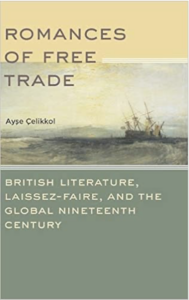 Ayşe Çelikkol, Romances of Free Trade: British Literature, Laissez-Faire, and the Global Nineteenth Century (Oxford UP, 2011).
Ayşe Çelikkol, Romances of Free Trade: British Literature, Laissez-Faire, and the Global Nineteenth Century (Oxford UP, 2011).
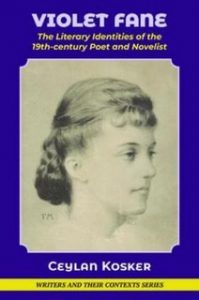 Ceylan Köşker Bevington, Violet Fane: The Literary Identities of the 19th-century Poet and Novelist (Edward Everett Root, 2021).
Ceylan Köşker Bevington, Violet Fane: The Literary Identities of the 19th-century Poet and Novelist (Edward Everett Root, 2021).
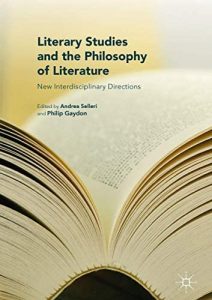 Andrea Selleri and Philip Gaydon, eds. Literary Studies and the Philosophy of Literature: New Interdisciplinary Directions (Palgrave, 2016).
Andrea Selleri and Philip Gaydon, eds. Literary Studies and the Philosophy of Literature: New Interdisciplinary Directions (Palgrave, 2016).

Andrea Selleri, ed., Literature and Philosophy in Nineteenth-Century British Culture. Volume 3: The Later Victorian Period, 1870-1910 (Routledge, 2024).
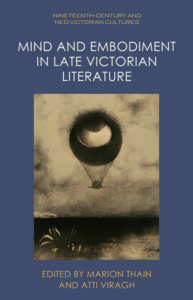 Atti Viragh and Marion Thain, eds., Mind and Embodiment in Late Victorian Literature (Edinburgh University Press, 2025).
Atti Viragh and Marion Thain, eds., Mind and Embodiment in Late Victorian Literature (Edinburgh University Press, 2025).
Articles and book chapters (last five years)
 Ivana Bičak, “From Praising the Remedy to Eulogising the Patient: Cristóbal de Castillejo’s Satire of Guaiac in Early Modern Spain,” Social History of Medicine 37.1 (2024): 141-59.
Ivana Bičak, “From Praising the Remedy to Eulogising the Patient: Cristóbal de Castillejo’s Satire of Guaiac in Early Modern Spain,” Social History of Medicine 37.1 (2024): 141-59.
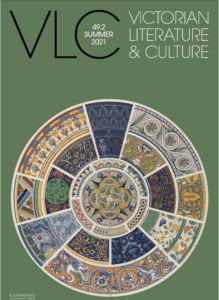 Ayşe Çelikkol, “Secularity and the Limits of Reason in Swinburne’s ‘Hymn to Proserpine’ and ‘Hymn of Man’,” Victorian Literature and Culture 49.2 (2021): 301-24.
Ayşe Çelikkol, “Secularity and the Limits of Reason in Swinburne’s ‘Hymn to Proserpine’ and ‘Hymn of Man’,” Victorian Literature and Culture 49.2 (2021): 301-24.
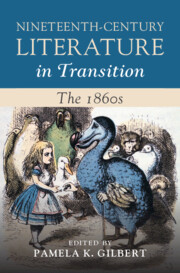
Ayşe Çelikkol, “Historical Ecologies in Heterodox Economic Thought and Literary Realism of the 1860s,” in Nineteenth-Century Literature in Transition: the 1860s, ed. Pamela K. Gilbert (Cambridge University Press, 2024), pp. 254-71.
Apala Das, “Modernity and Mobility: Re-reading Wordsworth and De Quincey,” The Explicator, 79.1-2 (2021): 48-51.
 Apala Das, “Reading in the Night of ‘The Rock’: Embodying Self-Referentiality in Late Stevens,” The Wallace Stevens Journal 45.2 (2021): 179-94.
Apala Das, “Reading in the Night of ‘The Rock’: Embodying Self-Referentiality in Late Stevens,” The Wallace Stevens Journal 45.2 (2021): 179-94.
Apala Das, “An Introduction to Sri Aurobindo’s ‘The Ideal Spirit of Poetry’ and ‘Conclusion’ from The Future Poetry (India, 1917),” in Aesthetics and Politics in the Global South, ed. J. Daniel Elam (Bloomsbury Academic, 2021), pp.?

Hatime Çiftçi and Ceylan Köşker Bevington, “Pragmatics in Discourse”, in Pragmatics and Language Teaching, eds. Şeyda Selen Çimen and Betül Bal Gezegin (Pegem Akademi, 2021):?
Ceylan Köşker Bevington, ‘Violet Fane‘, The Palgrave Encyclopaedia of Victorian Women’s Writing, eds. Lesa Scholl and Emily Morris (Palgrave Macmillan, Cham, 2021), pp.
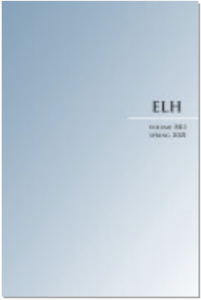 Andrea Selleri, “Oscar Wilde and the Freedom of the Will,” ELH 88.1 (2021): 167-97.
Andrea Selleri, “Oscar Wilde and the Freedom of the Will,” ELH 88.1 (2021): 167-97.
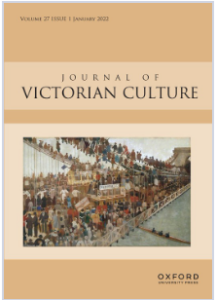 Andrea Selleri, “Swinburne’s Boyishness,” Journal of Victorian Culture 27.1 (2022): 135-49.
Andrea Selleri, “Swinburne’s Boyishness,” Journal of Victorian Culture 27.1 (2022): 135-49.
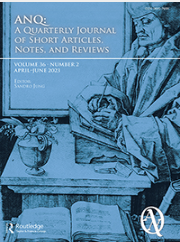 Andrea Selleri, “An American Source for Oscar Wilde’s A Woman of No Importance,” ANQ 36.2 (2023): 27-30.
Andrea Selleri, “An American Source for Oscar Wilde’s A Woman of No Importance,” ANQ 36.2 (2023): 27-30.
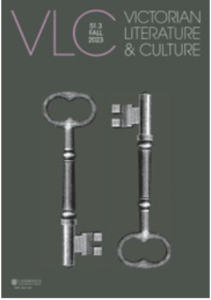 Andrea Selleri, “Free Will,” Victorian Literature and Culture 51.3 (2023): 411-14.
Andrea Selleri, “Free Will,” Victorian Literature and Culture 51.3 (2023): 411-14.
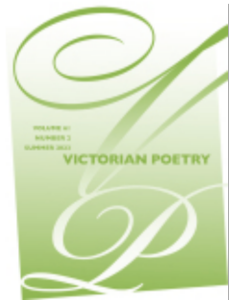 Andrea Selleri, “Ghostly Selves in Augusta Webster’s Poetry,” Victorian Poetry 61.2 (2023): 187-204.
Andrea Selleri, “Ghostly Selves in Augusta Webster’s Poetry,” Victorian Poetry 61.2 (2023): 187-204.
 Andrea Selleri, “The Roots of Wilde’s Tuberose,” Notes and Queries 71.1 (2024): 113-115.
Andrea Selleri, “The Roots of Wilde’s Tuberose,” Notes and Queries 71.1 (2024): 113-115.

Andrea Selleri, “Introduction: Literature and Philosophy in the ‘Long-Late-Victorian’ Period,” in Andrea Selleri (ed.) Literature and Philosophy in Nineteenth-Century British Culture. Volume 3: The Later Victorian Period, 1870-1910 (Routledge, 2024), pp. xxvii-xliii.
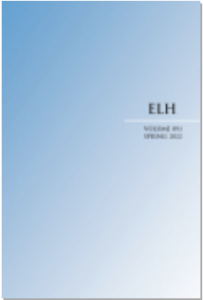
Atti Viragh, “‘The Keener Touch’: Walter Pater and the Hermeneutic Scene of Contact,” ELH 89.1 (2022), 185-213.
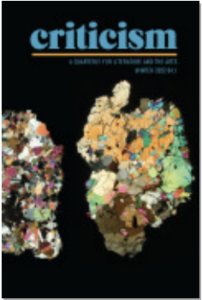
Jonathan Williams, “Melancholy’s Ends: Thomson’s Reveries,” Criticism: A Quarterly for Literature and the Arts 64.1 (2022), 53-76. https://doi.org/10.1353/crt.2022.0002
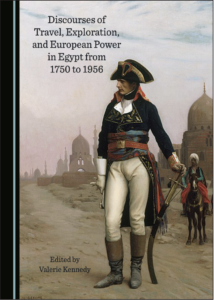 Jonathan Williams, “Rasselas, Egypt, and Cosmopolitan Oblivion,” in Discourses of Travel, Exploration, and European Power in Egypt from 1750 to 1956, ed. Valerie Kennedy (Cambridge Scholars Publishing, 2023): 16-30.
Jonathan Williams, “Rasselas, Egypt, and Cosmopolitan Oblivion,” in Discourses of Travel, Exploration, and European Power in Egypt from 1750 to 1956, ed. Valerie Kennedy (Cambridge Scholars Publishing, 2023): 16-30.
Forthcoming
Ceylan Köşker Bevington, “The Domestic Transformations of Bram Stoker’s Dracula in The Formative Years of the Turkish Republic”, in Adaptation in Turkish Literature, Cinema and Media eds. Seda Oz and Taner Can (London: Palgrave MacMillan, forthcoming).
Ceylan Köşker Bevington, “Empathetic Lacunae and Epistolary Writing”, in Poetics of Empathy: Exploring the Art of Understanding across Genres ed. Mine Özyurt Kılıç (London: Bloomsbury Academic Publishing, forthcoming).
Atti Viragh, “Close Reading and the Hermeneutic Circle of Attention,” in Close Reading as Attentional Practice, eds. Ewan Jones and Marion Thain (Edinburgh University Press, forthcoming).
Ongoing work
The Typology of the New Woman. Dr. Ceylan Köşker Bevington is currently working on a comparative study that examines the differing ways in which the New Woman is represented in both British and American periodicals of the nineteenth century. Taking as its starting point the prevalent conflicting images of the New Woman as a utopian ‘political woman of the coming century’ on the one hand and that of her as a ‘mannish brute’ representative of ‘a dystopic vision of a society gone wrong’ on the other, the article aims to define a typology of the New Woman that acknowledges the numerous gradations of depiction that exists between these polar extremes and offer more nuanced definitions of the New Woman than have been previously established.
Rural Capitalism and Nineteenth-Century British Literature. With the aim of putting New Economic Criticism in dialogue with ecocriticism, Ayşe Çelikkol’s book project discusses literary responses to the increasing commercialization of the countryside in Britain. Examining poems, novels, and travel writing by authors such as William Cobbett, John Clare, and Thomas Hardy, the project traces those insights about rural capitalism that crystallize in literary forms and techniques from parataxis to realist mediation.
The Author in Victorian Literary Culture. Dr. Andrea Selleri is completing a monograph on the history of the idea of the author between Romanticism and Formalism. The book will show that in Victorian criticism the Romantic idea that poets express their soul through poetry developed into a more eclectic concern with the concrete circumstances of writers’ lives, which extended from poets to dramatists and novelists. But with the development of alternative aesthetic ideals over the period, especially among Aestheticist writers at war with the prevalent morality, the method came under sustained fire. This dynamic laid the groundwork for early twentieth-century Modernist poetics.
Melancholic Life: Literary Expression and the Experience of History from Burton to Keats. Dr. Jonathan Williams is currently working on a book project that argues that writers in eighteenth-century Britain deployed the feeling of melancholy as a way of coming to terms with some of the contingencies of their historical presents. In the eighteenth century, this book argues, writers incorporated, sometimes simultaneously, the language of both depressive and genial states of mind to expound a more capacious version of the feeling: the model of melancholy that this book elaborates makes possible a mode of social criticism that fuses the physical body, mental activity, social life, and the cosmos.

